UofL Achieves Highest STARS Sustainability Rating in Kentucky
After three years of considerable work by countless staff, faculty, and students across the university, UofL officially earned a new, higher STARS Gold rating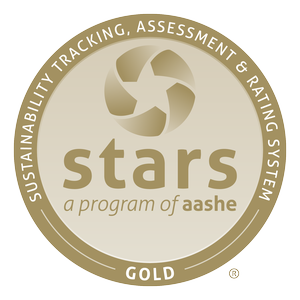 from the Association for the Advancement of Sustainability in Higher Education’s (AASHE) Sustainability Tracking, Assessment & Rating System (STARS) on Earth Day 2019. A summary spreadsheet of our 2019 STARS Report is now available.
from the Association for the Advancement of Sustainability in Higher Education’s (AASHE) Sustainability Tracking, Assessment & Rating System (STARS) on Earth Day 2019. A summary spreadsheet of our 2019 STARS Report is now available.
This is the fourth STARS report UofL has submitted since 2011 and we continue to increase our score each time. In the last three years, UofL increased its overall score by 1.05% to the highest STARS rating of any school in Kentucky at 66.24%. This also puts UofL in the top 100 most sustainable schools on the planet! This steady progress in sustainability has kept UofL in a leadership role in environmental, social, and economic stewardship.
We can attribute this progress to the on-going dedication of many individuals combined with the institutional wisdom dating back to 2008 of incorporating STARS into our university-wide strategic plan and signing onto the President’s Climate Commitment.
Our new STARS rating documents some of the truly innovative things we’re doing to advance sustainability. We have earned four new Innovation Credits for the: 1. Green Heart Project; 2. Urban Heat Island Study and Youth Summit organized through the Partnership for a Green City; 3. Cooperative Consortium for Transdisciplinary Social Justice Research; and 4. Maple tapping on campus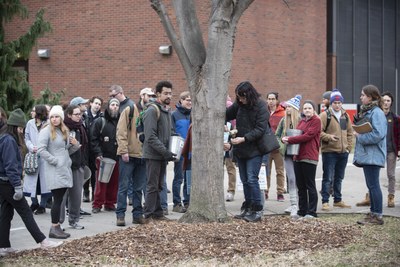 . We also documented our strengths and progress in:
. We also documented our strengths and progress in:
- Academics, including our new Major in Sustainability and wide array of Campus As A Living Laboratory projects.
- Engagement, including our new Living-Learning Community in Sustainability and Student Sustainability Fund.
- Operations, including Sustainable Dining initiatives, Biodiversity protection, Sustainable Procurement policies, support for Sustainable Transportation, Construction Waste Diversion, Hazardous Waste Management, and Stormwater Management.
- Planning & Administration, with superlative Sustainability Coordination, Support for Underrepresented Groups, and Wellness Program.
This chart summarizes our progress in all of the STARS categories:
Year |
STARS |
Overall |
Academics |
Operations |
Planning |
Engagement |
Innovation |
Gold |
66.24% |
56.95% |
53.34% |
70.25% |
78.68% |
100% |
|
Gold |
65.12% |
56.45% |
43.41% |
72.59% |
88.90% |
100% |
|
Silver |
58.29% |
51.95% |
31.60% |
79.31% |
n/a |
100% |
|
Silver |
50.11% |
54.59% |
28.54% |
67.21% |
n/a |
n/a |
There is truly much to celebrate! Yet, as the report makes clear, there is important work before us to not only maintain our standing, but to push ahead towards STARS Platinum (at 85%). Below are some key recommendations that ought to be considered in our planning going forward.
To continue making progress on sustainability, UofL must:
- Maintain a commitment to sustainability as an explicitly stated core value of the university. Sustainability needs to remain in our strategic plan with a goal to improve our overall STARS score by at least three points in the next three years, with the longer-term goal of achieving STARS Platinum (85% or more).
- Reaffirm our 2008 commitment to addressing the greatest challenge facing humanity and update our 2010 Climate Action Plan to commit to new, bolder goals to reduce our carbon emissions.
- Ensure 100% of employees and on-campus contract workers receive a living wage (currently $15.42/hr) with the total compensation provided to our lowest paid regular employee meeting or exceeding 200% of the living wage.
- Make an annual snapshot of the UofL Foundation's entire investment holdings publicly available, including specific funds/companies and proxy voting record.
- Ensure that at least 30-60% of the UofL Foundation’s investment pool is sustainably invested in: Sustainable industries (e.g. renewable energy or sustainable forestry), Businesses selected for exemplary sustainability performance, Sustainability investment funds, Community development financial institutions, Socially responsible mutual funds, and Green revolving loan funds.
- Increase affordability and access by expanding the percentage of: entering students who are low-income or eligible for need-based aid; graduating low-income students or those receiving need-based aid; need met for students who were awarded any need-based aid; and students graduating with no interest-bearing student loan debt or for whom no out-of-pocket tuition is required.
- Rejoin the Worker Rights Consortium with a small fraction of the revenues from our trademark licensing to ensure that UofL apparel is not made in sweatshops.
- Reduce waste and inefficiency in the operation and maintenance of our buildings by hiring a full-time, LEED-certified Energy Manager; by working toward the certification of building space as LEED for Existing Buildings: Operations & Maintenance; or by developing for uncertified spaces an energy management program, a green cleaning policy/program/contract, and/or a water management program.
- Develop a comprehensive plan to increase the percentage of renewable energy that UofL sources (on and off site) from the current 4.5% toward 80-100% in the next decade.
- Enhance the sustainability and local impact of our food and beverage purchasing by developing plans to: 1. reduce our total expenditures on conventional animal products; 2. increase food & beverage sourcing which is third-party verified (e.g. organic, fair trade, or Marine Stewardship Council) and/or sourced from local producers within 250 miles of campus.
- Reduce single-occupancy vehicle trips to campus and the distances traveled by commuters through a comprehensive Transportation Demand Management Plan that not only provides transportation alternatives, but addresses the abundance of subsidized, convenient parking accessed via annual permits and the need for attractive and affordable housing for students and employees to live within three miles of campus.
- Reduce the total amount of solid waste generated by UofL per capita and hire a full-time Zero Waste Coordinator.
- Reduce potable water use per capita, per square foot of building space, and per vegetated acre by up to 30% relative to 2006.
- Increase the percentage of academic departments and courses that expose students to the concepts, skills, and knowledge necessary to understand and address the interdisciplinary challenges of sustainability - i.e. wise social, economic, and environmental stewardship.
- Develop a published open access to research policy that ensures that future scholarly articles by faculty and staff are deposited in a designated open access repository for the benefit of all.
- Develop and conduct a pre- and post-assessment of sustainability literacy for our students.
The primary value of STARS is to guide our own work and internal strategic planning, but it’s also a useful tool for gauging our progress relative to other schools. Below is a summary of how we stack up: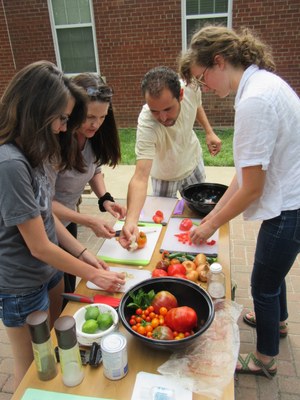
Kentucky Schools with a STARS rating |
Year |
Rating |
Points |
University of Louisville |
2019 |
Gold |
66.24 |
Berea College |
2017 |
Gold |
65.95 |
Jefferson Comm. & Tech. College |
2014 |
Silver |
58.80 |
Western Kentucky University |
2017 |
Silver |
54.15 |
Madisonville Community College |
2015 |
Silver |
47.07 |
University of Kentucky |
2015 |
Silver |
45.25 |
Transylvania University |
2015 |
Bronze |
40.58 |
Eastern Kentucky University |
2018 |
Bronze |
38.32 |
Hopkinsville Community College |
2013 |
Bronze |
32.13 |
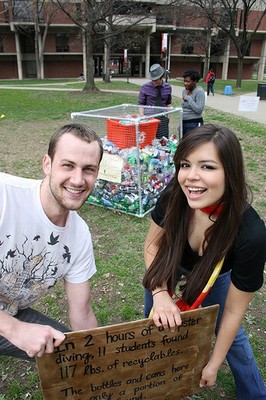
ACC Schools |
Year |
Rating |
Points |
Virginia Tech |
2017 |
Gold |
71.94 |
North Carolina |
2017 |
Gold |
71.75 |
Virginia |
2018 |
Gold |
66.30 |
University of Louisville |
2019 |
Gold |
66.24 |
North Carolina State |
2016 |
Gold |
65.87 |
Wake Forest |
2018 |
Gold |
65.53 |
Notre Dame |
2017 |
Silver |
63.29 |
Florida State |
2015 |
Silver |
61.36 |
Clemson |
2018 |
Silver |
53.85 |
Syracuse |
2018 |
Silver |
53.65 |
Miami |
2017 |
Silver |
52.77 |
PITT |
2018 |
Silver |
49.76 |
Boston College |
2018 |
Reporter |
|
Duke |
2015 |
Reporter |
|
Georgia Tech |
2012 |
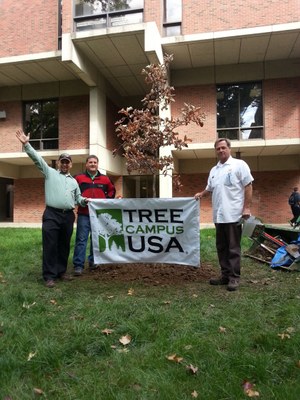
CPE Benchmarks for UofL |
Year |
Rating |
Points |
University of California - Irvine |
2018 |
Platinum |
86.82 |
University of North Carolina-Chapel Hill |
2017 |
Gold |
71.75 |
University of California - San Diego |
2018 |
Gold |
69.02 |
University of Cincinnati-Main Campus |
2017 |
Gold |
67.83 |
University of Louisville |
2019 |
Gold |
66.24 |
University of South Florida |
2018 |
Gold |
65.35 |
Virginia Commonwealth University |
2018 |
Silver |
60.83 |
University of Iowa |
2018 |
Silver |
59.34 |
University of Utah |
2017 |
Silver |
58.55 |
University of Illinois at Chicago |
2018 |
Silver |
54.91 |
Temple University |
2018 |
Silver |
50.04 |
University of Pittsburgh-Main Campus |
2018 |
Silver |
49.76 |
University of Alabama at Birmingham |
2016 |
Silver |
46.59 |
University of South Carolina-Columbia |
2016 |
Expired |
|
SUNY at Buffalo |
|||
SUNY at Stony Brook |
|||
University of New Mexico |
|||
Wayne State University |
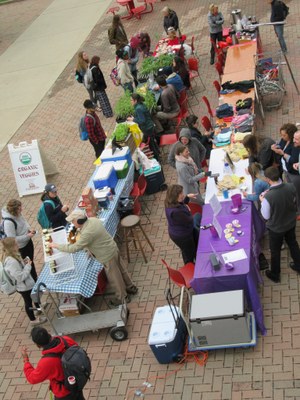
STARS Gold schools in the Southeast US |
Year |
Rating |
Points |
Appalachian State |
2015 |
Gold |
77.24 |
Florida Gulf Coast University |
2017 |
Gold |
72.05 |
Furman University |
2018 |
Gold |
71.65 |
George Mason University |
2017 |
Gold |
70.78 |
Emory University |
2017 |
Gold |
70.12 |
UNC Greensboro |
2015 |
Gold |
69.60 |
University of Georgia |
2017 |
Gold |
66.29 |
University of Louisville |
2019 |
Gold |
66.24 |
James Madison University |
2018 |
Gold |
65.92 |
Agnes Scott College |
2018 |
Gold |
65.20 |
University of Arkansas |
2017 |
Gold |
65.20 |



